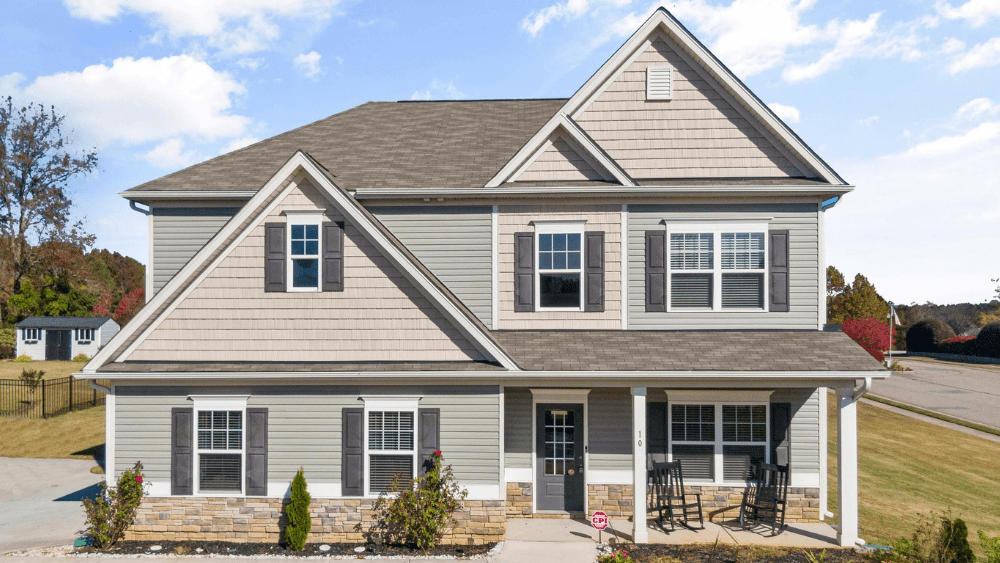In a competitive seller’s market, cash offers create advantages for both buyers and sellers. For buyers, choosing cash over traditional financing helps your offer stand out by removing contingencies tied to lender approval and avoiding the risk of loan delays or denials. For sellers, it means a smoother, quicker closing process without the uncertainty of lender approvals, making the transaction more convenient and reliable.
Speed Up Your Home Sale with a Cash Offer or a Top Agent
Use HomeLight’s Simple Sale platform to sell in as little as 7 days without repairs or showings. You can also receive and compare an estimate of what a top agent might be able to get for your house.
About 33% of homes sold in the first half of 2025 were purchased entirely with cash. Many buyers who had enough savings to make a cash offer or could leverage their equity took that route to avoid paying more interest over time.
Even if mortgage rates ease to the low 6% range in 2026, all-cash buyers are likely to remain a significant force, particularly among homeowners with substantial equity or those who are keen on building more equity.
Now that we’ve discussed the demand for cash offers in today’s real estate market, let’s explore what they are, who makes them, and their benefits for buyers and sellers.
What is a cash offer, and how common are they?
A cash offer in real estate simply means that the buyer does not finance the purchase with a mortgage. Typically, the buyer has the total sale amount in their bank account and purchases the house with a check or wire transfer.
You might not think that many people have the liquid assets to purchase a home for cash. But all-cash sales are becoming increasingly popular. In October 2025 alone, 29% of homebuyers paid cash, up from 27% a year ago.
Thanks to cash offers, many buyers were able to win bids and save money on interest. Cash transactions often lead to a quicker closing process, making them more appealing to sellers.
If you’re considering buying or selling a home for cash, it’s important to remember that a cash deal doesn’t necessarily negate closing costs. These costs are generally lower in a cash sale than in a traditional sale, but they still need to be covered.
How does a cash offer work in real estate?
A cash offer in real estate can simplify the homebuying process for both buyers and sellers. Without the need for bank approval or waiting on financing, the transaction can move forward quickly and smoothly. Let’s walk through the cash offer on house process to give you a better idea of what’s involved.
Step 1: Buyer makes the cash offer
The buyer submits an offer to purchase the property without financing through a mortgage. This offer typically includes the price they’re willing to pay and any terms they want to set, such as contingencies or closing dates. The seller reviews the offer, considering its strength, particularly since there’s no risk of financing falling through.
Step 2: Seller accepts the offer and both sign the contract
Once the seller agrees to the cash offer, both parties sign a purchase agreement, officially locking in the terms of the deal. The buyer may also submit an earnest money deposit to show commitment. This is the point where the transaction begins in earnest, with both parties preparing for the next steps.
Step 3: Buyer performs due diligence and inspections
Even without a lender, buyers usually still conduct inspections to assess the property’s condition. The buyer might negotiate repairs or ask for a price reduction based on the findings. This step ensures the buyer isn’t purchasing a home with hidden issues, despite the faster process.
Step 4: Buyers conduct a title search and place funds in escrow
A title company performs a title search to ensure the property is free of legal issues or outstanding debts. The buyer places the funds in an escrow account, which acts as a neutral holding place until the transaction is complete. This ensures that both the buyer and seller fulfill their responsibilities before finalizing the sale.
Step 5: Buyer and seller close the deal
Once everything is in order, the buyer and seller meet to finalize the sale, often at a title company or closing attorney’s office. The buyer transfers the agreed-upon funds, and the seller signs the deed to officially transfer ownership. With no mortgage involved, the process is typically much quicker, often closing in days to a couple of weeks.
Step 6: Buyers take ownership of the property
After closing, the buyer receives the keys and officially becomes the new homeowner. The deed is recorded in the local government’s records, ensuring the buyer’s ownership is legally recognized. The entire process, from offer to ownership, usually takes less time than traditional financing methods, offering both parties a smooth and quick transaction.
Cash offer vs. traditional financed offer
To understand what a cash offer means, it helps to contrast it with a traditional financed sale. Doing so highlights the key differences in timeline, risk, costs, and negotiation power. This side-by-side look can help you evaluate which type of offer best fits your needs.
| Factors | Cash offer | Financed offer |
| Timeline | Closes in days to a few weeks | 30 to 60+ days due to lender approval |
| Risk | Low; fewer chances of falling through | Higher; loans, appraisals, and underwriting can cause delays |
| Costs | Minimal; no lender fees or mortgage costs | Higher; includes lender and appraisal fees |
| Negotiation | Strong; sellers often favor cash | Weaker; more contingencies may hurt your offer |
In summary, cash offers usually provide a faster, smoother, and less risky transaction. Traditional financed offers can still work well, but they often involve more steps, time, and potential complications.
Who makes cash offers in real estate?
Various types of entities make cash offers. The first is pretty simple: a traditional buyer with liquid assets who is willing to pay cash. These are individuals or families who purchase a house or condominium for their living space.
A traditional buyer might have this cash ready for a home purchase if they’ve recently sold their last home and held onto the cash from the sale to avoid a mortgage on their new home. Additionally, they may have saved or inherited enough money to purchase the home outright.
Aside from the owner-occupant buyer, many cash offer companies, like direct buyers and iBuyers, purchase houses with cash. These companies generally aim to purchase a home without financing and close quickly so they can rehab or flip the property and turn a profit.
Secure an instant cash offer for your home
Sellers hoping for a cash transaction rather than a mortgage-involved sale may benefit from HomeLight’s Simple Sale. HomeLight has one of the largest networks of cash buyers in the country, providing an all-cash offer within 24 hours.
After answering a few short questions, we’ll give you a competitive offer that helps you sell quickly. Since there are no hidden fees or agent commissions and the closing process happens in as little as 7 days, you’ll have the confidence that you’re selling the fastest way for an excellent cash offer.
Why are cash offers great for sellers?
Why would a seller prefer a cash offer? These are the main ways sellers can benefit from a cash sale compared to traditional sales, where the buyer needs to finance a mortgage:
- Speedy transaction: This is particularly true when you use HomeLight’s Simple Sale platform, which can help you close in as few as 7 days, not months. Cash sales involving direct buyers, flippers, or iBuyers can dramatically cut down the average selling timeline of 75 days (34 days to attract an offer and 41 days for the buyer to close on a purchase loan).
- Less risk: A buyer proposing an all-cash offer may be willing to waive an appraisal, which mortgage lenders will often require to ensure they’re not financing an overvalued asset. This reduces the chance of the deal falling through due to a low appraisal and gives the seller greater confidence that the sale will proceed smoothly.
- Fast cash in hand: With a cash offer, sellers can get their money quickly, which comes in handy for things like finalizing a divorce, paying unexpected bills, or funding an out-of-state move.
It’s easy to be tempted by a cash offer for your home. After all, what could be better than a quick sale for a great price? However, in some instances, cash buyers pay less than financed buyers, as financed buyers are more likely to have to compensate for the risks to the sale that come with a mortgage in the form of a higher offer.
Working with a top agent like George Kypreos of Las Vegas, Nevada, can increase your chances of selling for your ideal listing price.
In Kypreos’s market, “cash offers are paying just as much as financed offers,” he says. “If I had the choice, I would rather entertain a cash offer because there’s just less red tape and risk.”
Because experienced real estate agents keep up with market trends and are experts in their respective geographical areas, partnering with them can significantly increase your chance of selling for more money. Plus, the general population is aware of how a great agent can speed up and smooth out the process. About 91% of sellers worked with a real estate agent.
Verify proof of funds in cash transactions
Cash offers can be very appealing, but not all buyers are equally reliable. It’s important to do your due diligence to confirm they actually have the money to follow through. Here’s how you can verify it:
- Request a proof of funds letter: A proof of funds letter from the buyer’s bank or financial institution can assure you that the buyer has the cash available for the deal.
- Check for specifics: Make sure the proof clearly states the buyer has the exact amount available for the home purchase, including closing costs.
- Verify the source: If you’re feeling extra cautious, ask where the funds are coming from, whether it’s from savings, the sale of another property, or another source.
- Trust your gut: If something feels off or the buyer’s proof seems vague, ask for more information or consider other offers.
Why are cash offers great for buyers?
Now that we’ve answered the pressing question, “Why is a cash offer on a house better for seller?” let’s shift to the buyer’s side. The truth is, cash home sales are equally beneficial to homebuyers, allowing them to be mortgage-free, avoid interest payments, reduce closing costs, and gain a stronger negotiating position.
Non-mortgaged transactions are hardly a thing of the past. However, it’s still important to weigh the pros and cons of a cash offer on a house. Here are a few ways that a buyer can benefit from a cash purchase:
- Lower purchase price: Paying cash for a house can save you money on the listing price. Sellers are often willing to accept a lower cash offer for a fast and hassle-free sale instead of dealing with the sometimes months-long traditional sale process.
- No mortgage interest: One huge benefit to paying cash for a home is that you don’t have a monthly mortgage payment. As of writing, the average 30-year fixed mortgage rate from Freddie Mac is 6.26%. Paying cash for a home can save you money in the long run, since you don’t have to pay elevated interest rates or go through the hassle of refinancing every couple of years when a lower interest rate presents itself.
- Stronger cash buyer negotiating power: Sellers love cash buyers because there’s no worry about deals falling apart over financing. This gives you some serious bargaining power, helping you score a better price or more favorable terms.
Buying a home for cash can help you save money in the short term and the long term. Before you decide whether to proceed with a cash purchase, talk to your real estate agent to make sure you’re making the right offer for the right home to fit your needs.
Make a cash offer while waiting to sell your home
If you’re relying on the sale of your home to make a cash offer, the uncertainty of timing can be stressful and might cause you to miss out on your dream home. Fortunately, it’s possible to buy a new property without waiting for the current one to sell.
HomeLight’s Buy Before You Sell program lets you tap into your home equity and use the funds for a down payment on a new home. With ready cash, you can make a strong offer without the need for a home sale contingency.
As you settle into your new place, you’ll have time to prepare your old home and make it more appealing to buyers, increasing the likelihood of selling for top dollar. Consider HomeLight’s Buy Before You Sell program to make a compelling, cash-backed offer that sellers won’t be able to resist.
Compare Your Options: Cash Offer vs. Top Agent
If you need to sell your home in days, not months, HomeLight can provide you with a no-obligation, all-cash offer through our Simple Sale platform. This online tool also allows you to compare your offer with what a top agent might be able to get for your house.
When cash offers aren’t always best
While cash offers are often attractive because they close quickly and come with fewer contingencies, they aren’t always the most profitable option for sellers. If your home is in a high-demand area, a buyer with financing might be willing to pay more than a cash buyer, making it worth waiting for the higher offer.
Cash offers are best considered when speed and certainty are top priorities, such as if you need to close quickly or want to avoid appraisal or financing hurdles. If you’re not in a rush and the market shows strong buyer competition, holding out for a financed buyer could net you a higher sale price.
Sellers should also weigh the stability of cash offers against the potential for appraisal gaps or mortgage approvals with financed buyers. Consulting with your real estate agent can help you evaluate the trade-offs between speed, certainty, and maximizing value. Ultimately, the “best” offer depends on your timeline, financial goals, and comfort with risk.
For buyers, cash isn’t always best either. Paying all cash can tie up a significant portion of your savings, reduce liquidity for other investments, and eliminate the benefits of low mortgage rates or tax deductions. Additionally, a cash offer doesn’t automatically guarantee the best price. You might overpay in a competitive market without lender safeguards like appraisals.
Consulting with a real estate agent can help both buyers and sellers evaluate the trade-offs between speed, certainty, and maximizing value. Ultimately, the “best” offer, whether cash or financed, depends on your timeline, financial goals, and comfort with risk.
Cash offers help both sellers and buyers
A real estate transaction can be a stressful experience for both the buyer and the seller. Buying or selling for cash can reduce the stress on both sides of the transaction. So, if you’re putting your home on the market or starting to look for your next residence, keep your mind open to a quick and easy cash sale.
Partner with a proven real estate agent today to ensure you’re working with a legitimate cash buyer or securing a good deal in your desired neighborhood.
Frequently asked questions about cash offers in real estate
A cash offer, meaning the buyer pays the full price of the home upfront without relying on a mortgage, is a straightforward way to purchase a property. This type of offer removes the uncertainty and delays associated with lender approval. They often appeal to sellers because they reduce the risk of a deal falling through due to financing issues.
Yes, a true cash offer means the buyer is offering to pay the entire purchase price without any loans. However, it doesn’t mean the buyer is handing over physical bills. It simply means the purchase will be funded without a mortgage, usually through a bank transfer, wire, or cashier’s check. The money is fully available upfront, allowing for a quicker, simpler closing process.
A reasonable cash offer is typically based on the market value of the home, considering factors like the condition of the property, comparable sales in the area, and the seller’s urgency. Buyers may offer slightly less than the asking price, especially if they are aware of any issues with the property. It’s essential to do thorough research and consult with a real estate agent to determine a fair offer.
Accepting a cash offer can be an excellent choice if you want a faster, smoother transaction with fewer complications. Cash buyers often close more quickly and may be less likely to back out due to financing issues. However, it’s important to ensure the offer is fair and that the buyer is legitimate before agreeing to the sale.
As a seller, taking a cash offer can save you money by avoiding appraisal hiccups, loan issues, and last-minute repair negotiations. Buyers, on the other hand, can save on interest, lender fees, and sometimes even score a better price by paying cash. How much you save depends on the home and the market, but cash deals usually cut costs and make everything go faster for both sides.
Header Image Source: (Anton Marchuk / Unsplash)



















 English (US) ·
English (US) ·